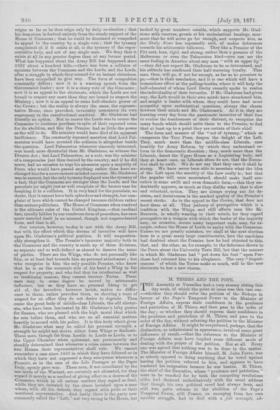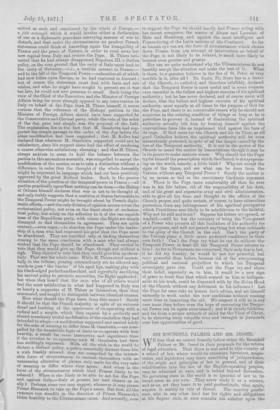M. TRIERS AND THE POPE.
THE Assembly at Versailles had a very stormy sitting this day week, of which the point at issue was this vast one, —whether they should refer the petition of the Bishops in favour of the Pope's Temporal Power to the Minister of Foreign Affairs, express their confidence in the prudence and patriotism of M. Thiers, and then pass to the order of the day ; or whether they should express their confidence in the prudence and patriotism of M. Thiers, and pass to the order of the day, without referring the petition to the Minister of Foreign Affairs. It might be conjectured, perhaps, that the distinction, BD infinitesimal in appearance, involved some great difference of result,—that the reference to the Minister of Foreign Affairs may have implied some different mode of dealing with the prayer of the petition, Not at all. Every one was agreed that nothing was to be done in the matter. The Minister of Foreign Affairs himself, M. Jules Favre, was so utterly opposed to doing anything that he voted against having the petition referred to him, and appears to have tendered his resignation because he was beaten. M. Thiers, the chief of the Executive, whose " prudence and patriotism " were to be vouched for by both the competing resolutions alike, had declared authoritatively with his usual address that though his own political creed had always been, and still was, quite adverse to the abolition of the Pope's Temporal Power, still France, on emerging from her own terrible struggle, had to deal with a fidi accompli, ad-
naitted as such and sanctioned by the whole of Europe,— a fait accompli which it would involve either a declaration of war or a diplomatic procedure conveying menace of war to disturb, and that under the circumstances no prudent French statesman could think of hazarding again the tranquillity of France and the peace of Europe, in order to rend away her new capital from Italy and restore the Pope. M. Thiers inti- mated that he had always disapproved Napoleon M.'s Italian policy, on the very ground that the unity of Italy must lead to the unity of Germany,—i.e., a terrible menace to France,— and to the fall of the Temporal Power,—calamities all of which had now fallen upon Europe, as he had ventured to forecast ; but of course the statesman must deal with facts and not wishes, and what he might have sought to prevent ere it was too late, he could not now presume to assail. Such being the view of the Chief of the Executive, and the Minister of Foreign Affairs being far more strongly opposed to any intervention in Italy on behalf of the Pope than M. Thiers himself, it seems curious that the reference of the Bishops' petition to the Minister of Foreign Affairs should have been supported by the Conservative and Clerical party, while the vote of the order of the day, pure and simple, was the proposal of the Left. The explanation lies in the fact that M. Gambetta had sup- ported the simple passage to the order of the day before the other modification had been suggested ; that M. Keller had declared that whatever M. Gambetta supported could not be satisfactory, since his support alone had the effect of rendering a course otherwise satisfactory, alarming ; and that M. Thieve, always anxious to seem to hold the balance between the parties in this anomalous assembly, was compelled to accept the modification of the motion so as to take a distinction without a difference, in order that the thought of the whole Assembly might be expressed in language which had not been positively approved by the great Radical leader. Such is the precise situation of the question of the temporal power in Prance ;—all parties practically agree that nothing can be done,—the Bishop of Orleans himself declares that war is not to be thought of, and only feebly suggests that a coalition of States favourable to the Temporal Power might be brought about by French diplo- matic efforts,—and the only division of opinion occurs not on the ecclesiastical policy, not even on the finest shade of ecclesias- tical policy, but solely on the adhesion to it of the one capable man of the Republican party, with whom the Right are simply dismayed to find themselves in agreement. They are quite content,—eyen eager,—to abandon the Pope under the leader- ship of a man who had expressed his grief that the Pope must be abandoned. They are horrified only at finding themselves coming to the same conclusion with a man who had always wished that the Pope should be abandoned. They wished to vote that they would give up the Pope, though not without a sigh. They objected to vote that they would give him up cheer- fully. That was the whole issue. While M. Thiers stood mourn- fully in the tribune, pausing ostentatiously ere he allowed any words to pass "the barrier" of his aged lips, making play with his black-edged pockethandkerchief, and regretfully sacrificing his ancient policy to patriotic necessities, the Right applauded ; but when they heard that the man who of all others would feel the most satisfaction in what had happened in Italy was as hearty a supporter of M. Thiers as themselves, then they murmured, and sought to distinguish between identical courses.
Now what should the Pope learn from this scene ? Surely it should be that the French majority, in spite of an extreme dread and loathing of the appearance of co-operating with a radical and a sceptic, which they express by a perfectly and almost senselessly trivial modification of the resolution they had intended to adopt,—a modification suggested and carried solely for the sake of seeming to differ from M. Gambetta,—are com- pelled by the irresistible logic of facts to co-operate with him heartily, a result far more instructive and significant than if the aversion to co-operating with M. Gambetta had been less strikingly expressed. With all the wish in the world to dictate a distinct policy, a policy essentially distinct from his a wish frankly avowed, they are compelled by the intract- able force of circumstances to content themselves with an unmeaning alteration of phrase only made for the very sake of seeming to differ where they agree. And when is the force of the circumstances which bind France likely to be relaxed ? When is she likely to be able to act for the Pope and against Italy,—Italy at present her best chance as an ally ? Perhaps 801310 one may suggest, whenever it may please Prince Bismarck to take up the Pope's cause. But first, all the rumours run steadily in the direction of Prince Bismarelr's bitter hostility to the Ultramontane cause. And secondly, even
to support the Pope we should hardly find France acting with her recent conqueror, the master of Alsace and Lorraine, of Metz and Strasburg, and against the most intelligent and France-loving of the Latin nations of the Continent. As far as human eye can see, the force of circumstances which chains down France from any attempt at intervention on behalf of the Pope, is not likely to be relaxed, is much more likely to become even greater and greater.
Nor can we quite understand why the Ultramontanes do not heartily accept the situation and make the best of it. What is there, to a genuine believer in the See of St. Peter, so very terrible in it, after all ? No doubt, Pie None has as a doctor of the Church, ex cathedra, and therefore infallibly, declared that the Temporal Power is most useful and in seine respects even essential to the fullest and highest exercise of his spiritual authority ; but he has never declared, and of course never will declare, that the fullest and highest exercise of his spiritual authority, must equally at all times be the purpose of God for the Pope, and there is no conceivable reason why he should not acquiesce in the existing condition of things so long as he is powerless to prevent it, instead of diminishing the spiritual authority actually left him by beating himself against the unpropitious fates like an imprisoned bird against the bars of its cage. If God cares for the Church and for its Vicar, as all good Catholics believe, the spiritual authority will be even. miraculously protected, in spite of all the danger caused by the loss of the Temporal authority. It is not in the power of the Church to mend the matter by lamentations, though it may be in its power to make matters worse. Why should not the Pope try for himself the prescription which the Church is always press- ing on the world, namely, a little faith? Why not accept the. signs of the times, and sae what can be done from the Vatican without any Temporal Power ? Surely the matter is by no means so bad as the reactionary Cardinals represent it. There is the Pope more comfortably off than he ever was in his life before, rid of the responsibility of his debt, and of his great and expensive army and civil administration, able to give all his time and thought to the affairs of the Church proper, and quite certain, of course, to have miraculous protection from any infringement of his spiritual prerogative which Providence sees likely to be mischievous to the faithful. Why not be still and trust ? Suppose his letters are opened, or waylaid,—still he has the certainty of being the Vice-gerent of a Power who permits all this limitation of his authority for good purposes, and will not permit anything but what redounds to the glory of the Church in the end. Can't the party of the Vatican place a little more profound confidence in their own faith ? Can't the Pope try what he can do without the Temporal Power, at least till the Temporal Power returns to him ? As far as Protestants are concerned, their only fear is lest, if he did try frankly, he would be not less powerful, but more powerful than before, because rid of the overpowering political and national prejudices to which his Temporal sovereignty gave rise. Could not the Pope try and share their belief, especially as, in him, it would be a new sign of grace to trust that that which seemed to him so indispen- sable to his work, could be dispensed with by the divine Head
of the Church without any detriment to his influence ? Let the Pope for once take an honest foe's advice, and set himself earnestly to work under the new conditions without wasting more time in lamenting the old. We suspect it will be in any case some time before oven the hope of recovering the Tempo- ral Power can be again entertained ; and it is clearly faithless, and far from a proper attitude of mind for the Vicar of Christ, to be throwing away valuable time and strength in jereuaiada over lost opportunities of good.

































 Previous page
Previous page